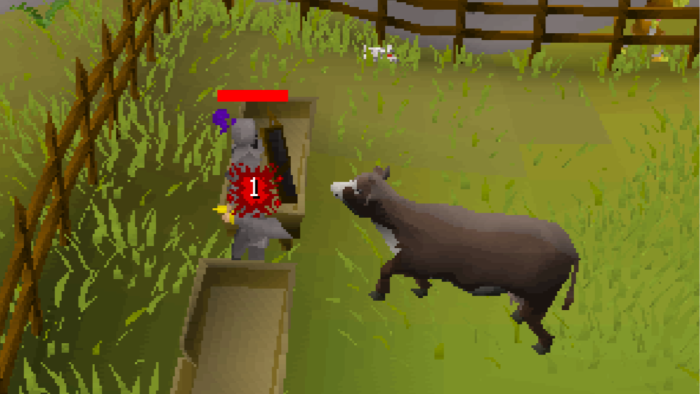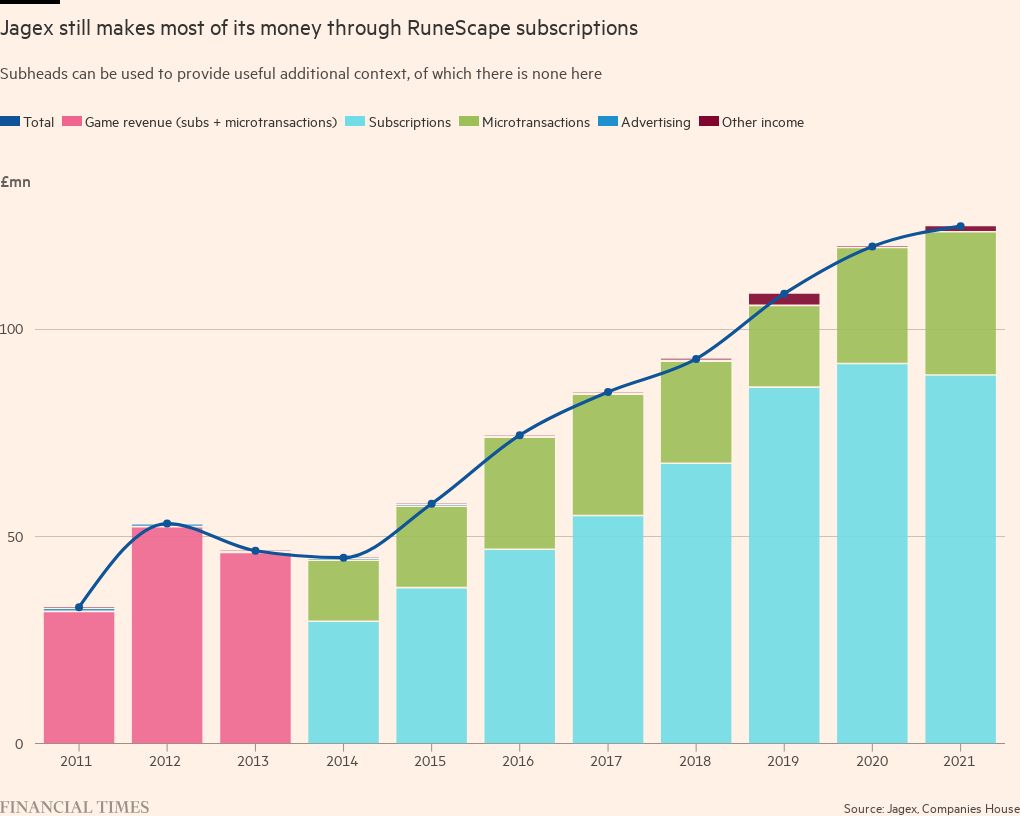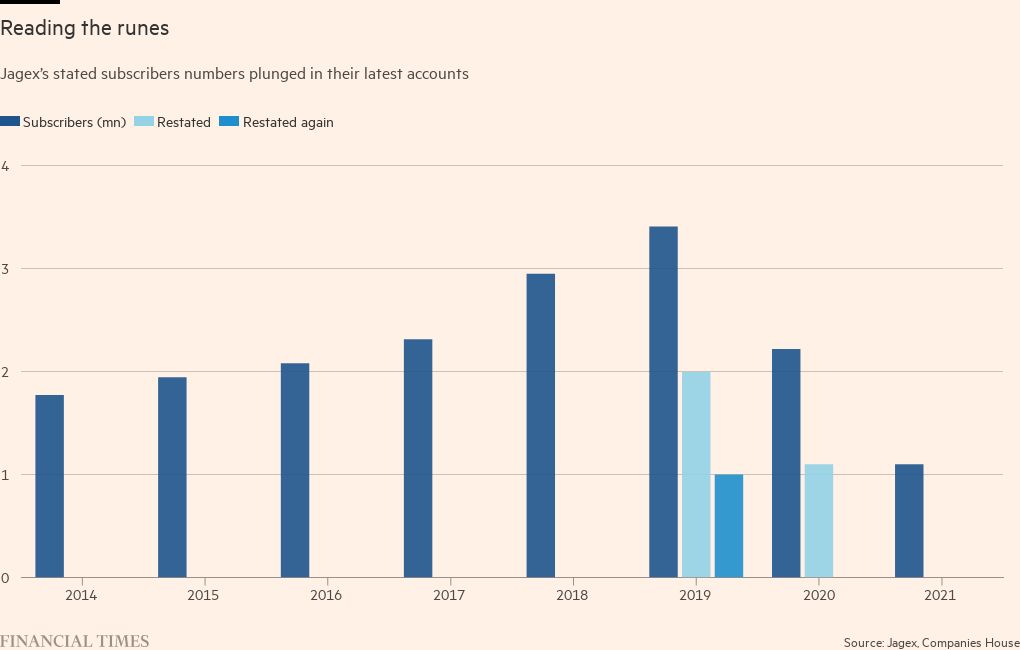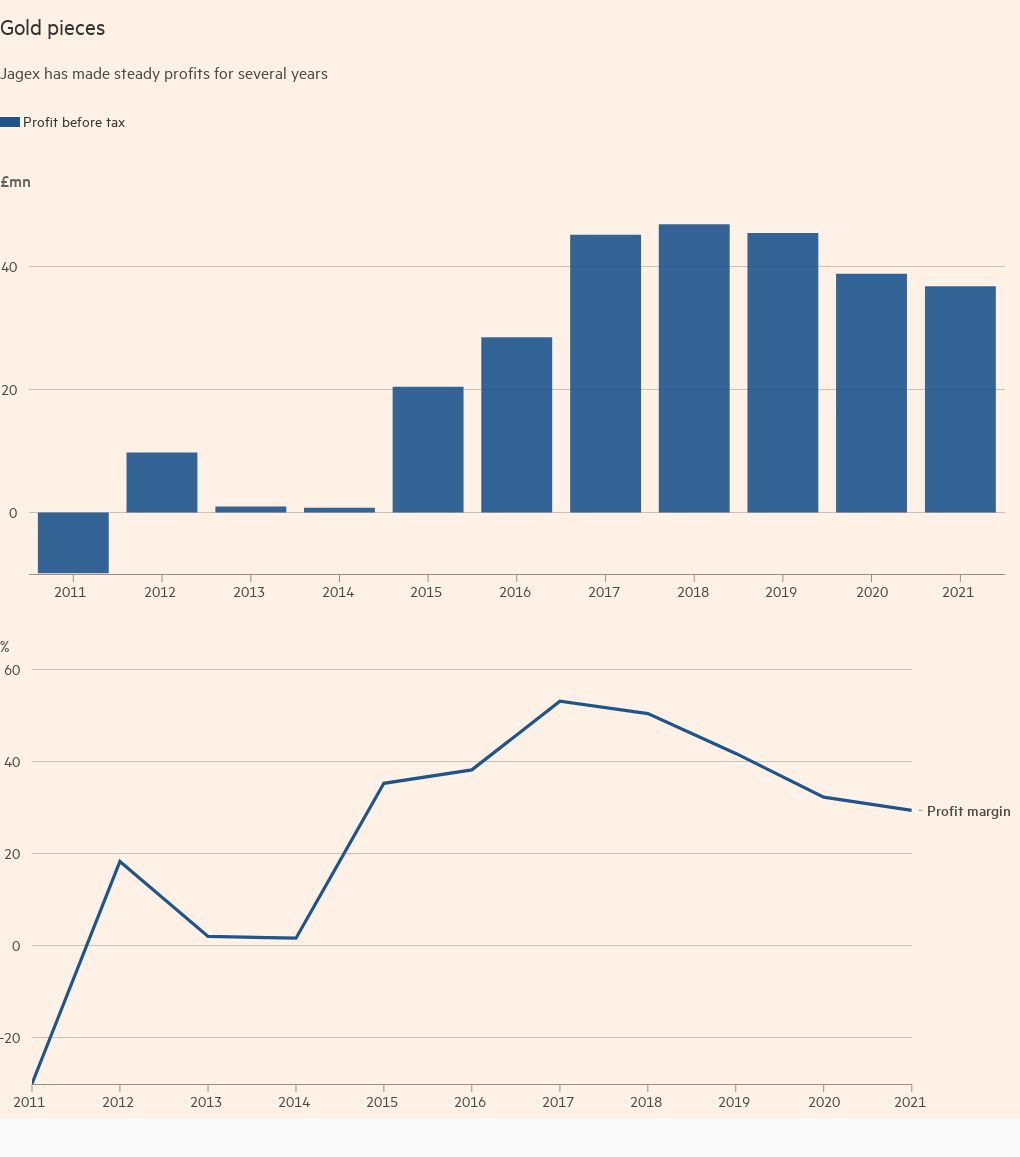Spending a lot of time on RuneScape

Roula Khalaf, Editor of the FT, selects her favourite stories in this weekly newsletter.
Somebody is buying RuneScape again:
Private equity group Carlyle is to sell UK video games maker Jagex to Europe’s CVC Capital Partners in a deal estimated at just below £1bn as interest in the industry heats up.
MainFT says the sale to CVC and Haveli Investments is worth “about £910mn”, marking a substantial increase in the valuation of Jagex — which Carlyle bought from Macarthur Fortune Holding for (just) £502mn three years ago.
The developer’s valuation has now more than quadrupled since 2016, when it was bought from US private equity by Chinese miner Shandong Hongda in a somewhat mystifying piece of diversification:
Phwoar.
But sorry, we’re getting ahead of ourselves.
The great ’Scape
Jagex is a Cambridge, UK-based video games developer, that (despite numerous attempts at making other games) is best known for making one game, which comes in two versions: RuneScape.
RuneScape, launched in 2001, is a massively multiplayer online game (MMOG). More specifically, it’s a fantasy massively multiplayer online role-playing-game (MMORPG). Even more specifically, it’s a online game set in a medieval-ish world in which you control a character who can do things like put on clothes, chop down trees, fight dragons, talk to other players, trade with other players, fight other players and set up a giant spinning cannon in order to inflict genocide upon rock crabs. If that doesn’t clarify anything, it’s basically like World of Warcraft. If that still doesn’t clarify anything we can’t help you further but please continue reading.
RuneScape comes in two types: regular RuneScape (also known as RuneScape 3), and the more-popular Old School RuneScape (OSRS), which is basically a retro version of the game. According to some questionable data, OSRS is the world’s third-biggest MMO.

Jagex claims more than 300mn RuneScape accounts have been made over the game’s lifetime, and many a youngish person in Europe and the US will have spent at least some time playing the game at school.
Thanks to a reasonably sophisticated in-game economy, it has offered players a rudimentary education in bid-ask spreads, arbitrage, price gouging, scarcity value and more. Without wanting to stereotype, if you work in anything finance-adjacent in the US, UK or Europe, show your nearest 30ish-year-old nerd this meme and see how they react:

Its longevity — without the relentless release schedule, hybrid revenue streams and heavyweight backing of WoW — is remarkable. It has adapted by not really adapting: in OSRS, all changes to the game must be approved by players via referendum (making it unusually community-led), and the game is fundamentally similar to the one people were playing twenty years ago.
A large amount of both RuneScapes’ content is free-to-play. Jagex makes money through a mixture of member subscriptions and microtransactions (small-scale transactions, usually allowing players to unlock in-game items or features). Subscriptions are the main bit. Here’s the breakdown up to 2021, the most recent year for which Jagex has published accounts (its 2022 accounts are overdue at time of pixel):
Gold, members
Here, via Goodbody analyst Patrick O’Donnell, is a précis on the deal (our emphasis):
It represents a very strong exit for Carlyle in a more challenging market for games companies who acquired the business in 2021… Following that acquisition, they acquired Pipeworks in the US from Sumo to build service capabilities and provide support for Runescape. This addition likely assisted Runescape’s transition to mobile. The business also acquired Gamepires, developer of SCUM during the Carlyle tenure, an open-world survival game which launched on Early Access on Steam in 2018 with the title remaining consistently within the top 100 concurrent titles on Steam. It was recently reported that SCUM is coming to Xbox as Jagex look to leverage the consistent engagement in the title to other platforms.
The prized asset of Jagex is Runescape, its MMORPG title which generates the majority of its revenues and remains consistently in growth mode over 20 years with a significant component of revenue in subscription. According to MMO Population tracker, it has c 18.7m subscribers and 353k daily active players which ranks number 14 of 140 tracked MMOs. The statement notes 2.4m active subscribers and 300m lifetime Runescape accounts.
With CVC Capital Partners and Haveli Investments acquiring the business, the focus appears bring to bear CVC’s experience with sports, media and entertainment assets to extract the full potential of its live-service capabilities in Jagex, driving increased visibility for Runescape and other titles to broader platforms but also reinvesting in new IP content. Haveli also share CVC’s appetite to work with Jagex, as a leading player in the MMO category with a proven and growing loyal fan base.
There’s a lot to take in here.
First of all, it’s hard to dispute that Carlyle has done well, selling Jagex for a roughly 80 per cent markup on its purchase price.
The valuation obtained is ever more remarkable when you consider that the £502mn Carlyle paid for Jagex (according to the holding company’s accounts) consisted primarily of £341mn for the company’s “brand, technology acquired and customer relationships”, plus £208mn of goodwill — the latter of which was subsequently impaired by £166mn due to the changed inflationary/rate environment and delayed game release dates.
Now, about that questionable data we referred to earlier. The go-to source for RuneScape’s playerbase size, cited by O’Donnell, is mmo-population.com. He’s chosen to use RS3’s position (12th), which seems odd because OSRS is the bigger game, in 3rd place. Regardless, combining the two gives 1.7mn active players. Jagex does not disclose which of the two produces greater revenues, but it’s not hard to guess.
Unfortunately, the site’s methodology is a bit bonkers. Here’s some text and a screenshot from mmo-population’s “about” page, which details its methodology thusly:
It’s virtually impossible to work out accurate subscriber counts for MMOs today, and this site cannot do that. However, there does exist a need for people to be able to gauge the activity, growth, decline, and popularity of MMOs.
So, we do it based on reddit subscriber information. We track the current subscribers, active users and history of both. This helps you to choose an MMO that has the required “activity” you’d like to see, or perhaps you are just interested.

Clearly, this data ends up being more a measurement of Reddit’s popularity among a game’s playerbase than the popularity of the game itself (Jagex recently closed its own forums to focus on communicating to players via chat app Discord).
We’re not meaning to knock the website overly (we’ve done some dodgy sums in our time). As the creator goes on to say…
There is no way of really getting MMO subscriber numbers today. If you need accurate numbers you will have to look for publicly released data, use steam users, or whatever method is available.
…which is completely valid, and unfortunately has its own issues.
Here’s a reminder of what CVC is claiming:
RuneScape boasts a 20+ year history of leadership in the development of live service gaming, an unparalleled and vibrant community of 2.4 million active subscribers and one million free-to-play users, with over 300 million lifetime RuneScape accounts.
An exploratory excursion to Alphaville’s favourite hive of scum and villainy, Companies House, was typically bittersweet. Obviously, game subscribers aren’t a typical line item in accounts but since 2014 Jagex (like the Telegraph) has disclosed them as a key performance indicator.
Subscribers rose to a peak of 3.41mn in 2019’s accounts, but this figure was restated as just shy of 2mn in 2020’s accounts, and then as 1.1mn in 2021’s accounts.
The latest accounts, for 2021, put subscribers at 1.1mn, which is a lot less than the 2.4mn stated in the press release:
Naturally, this also has a striking impact on both the claimed playercount and — perhaps more materially — Jagex’s implied subscription revenues per subscriber.
One person familiar with Jagex’s operations told us the company had changed how this subscriber KPI is calculated. The 1.1mn figure, they said, represents average annual subscribers, while the 2.4mn figure is total annual subscribers. The person said this latter number “better reflects the magnitude of the paying userbase”, and that the number of subscribers continues to increase year-on-year. (Jagex declined to comment.)
A person familiar with CVC’s operations told FTAV that there are now about 1.2mn average annual subscribers, a figure that consists of around 600,000 accounts that remain subscribed all year, and a further 600,000 based the average paid playtime of 1.8mn other accounts that only subscribe for some of the year. This figure has risen steadily from 1.6mn in 2015, we were told.
What the older KPI figures in the accounts mean remains a mystery that neither of these people could solve: we reckon it is probably a total of all paying + free active accounts.
What’s a sub worth? Here are the current prices for a RuneScape subscription…
…and here, taking the US pricing as an example (the US is RuneScape’s biggest market, representing about 55.6 per cent of revenues in 2021), is how membership prices have changed over time:
Overall, it came out at about £80 in subscription revenue per average subscriber per year in the latest accounts.
What this means for Jagex as an investment is harder to unpick: RuneScape’s average paying player community is smaller, but spends more per head, than the deal bumpf or its older accounts indicate.
Of runes and robots
The 1.2mn figure needs further scrutiny. Having 1.2mn average subscribers does not mean you have 1.2mn average paying players, as the figure will include:
— people with multiple accounts (Jagex has a one account, one subscription model)
— paid ‘bot’ accounts that are programmed to automatically grind through some of the game’s more laborious elements (the notorious flax bots are one example).
The reality might be that often when a player hangs up their dragon boots (g) for good, multiple “subscribers” are lost, and that there’s a swathe of bot accounts that will likely diminish rapidly once there’s no real playerbase for them to serve.
The role of bots is particularly significant here. For basically as long as RuneScape has been a thing, people have used bots to reduce the parts of the game that require a lot of (Pharrell voice) grindin’: primarily, harvesting in-game currency and items.
Explaining it in simple terms, bots are like a more sophisticated version of the drinking bird from The Simpsons. OSRS is replete with boring tasks that are roughly like:
— click on a tree to chop it down
— pick up the wood that has fallen from the tree
— take the wood to storage (in a ‘bank’)
— return to the tree
These tasks (other examples include fishing, cooking, mining and smithing) are integral to the game’s economy, but they do not make for the most engaging gameplay.
So rather than spend their one wild and precious life doing them, some players will set up their computers to issue such commands on a loop to a throwaway account (a bot), then later transfer the fruits of their automated labour to their main account.
Some people only operate bots, and plenty of money moves around outside of the game as players exchange real-world currency for in-game items and money.
Bots are controversial. On the one hand, there are online communities dedicated to botting (the most popular posts on /r/RuneScapeBotting seem to involve people claiming to have got away with it). On the other hand there are many threads full of quotes like this one (from RS’s forums last year):
I’ve been training one of my accounts on OSRS and was blown away by the consistent amounts of bots and scammers that are infecting OSRS.
I have reported consistently but nothing gets done. Why do people feel they have to bot? Why can’t they play the game the way it’s supposed to be played...do the grind.
A member of Jagex’s marketing team, Alec Sween (aka Mod[erator] Sween), said last September that Jagex was banning 200,000 bots per month. He told players:
People are rightfully annoyed and frustrated about the botting situation, and you’ve felt like we’ve been ignoring you. And we haven’t really, we’ve been raising it internally all the time, and I thought it would be best to just talk about it a little more openly and a little more frankly… at the moment a lot of people are saying we’re not banning bots on purpose, you know padding numbers and that kind of thing. It isn’t true. That’s untrue… we are banning bots…
…but again, we see your frustrations. It’s annoying. I’ve been playing a lot lately, I’ve been proper stinky [?!], I‘ve been playing it a tonne. I get just as frustrated as everybody else…
We are working on bigger initiatives to tackle botting, we are, that’s in place, that’s in flight, but they’re not ready to be publicly discussed yet.
A person close to Jagex told us the actual bot figure may be even higher, with around 6.9mn bot accounts “detected and purged” last year.
From a business perspective, however, there‘s a philosophical issue: these bots are now part of the game experience, and for many (paying) players, it’s bot labour that allows them to focus on more enjoyable parts of the game like doing quests and fighting other players.
The message from the incoming management seems to be that some bots are basically ok — especially if their owners are paying.
“Bots are a part of the RuneScape ecosystem, they just are,” the person close to CVC told us. They continued:
The main focus within the game is to make sure the excesses of bots are policed and managed. Flagged accounts are managed out of the game, and therefore what is left inside the game is a sort of equilibrium of players and bots… if I have [three accounts] there’s a good chance that one of them is me and two accounts are bots… If a player is sufficiently committed to pay for three accounts, and have an account and two bots as part of its ecosystem, then so be it. But the management team of Jagex police excesses of bots and make sure that bots do not become problematic in the game.
They told us CVC does not know how many bots there are in RuneScape, but that bots are not included in the overall player counts.
We’re honestly sympathetic: if someone ostensibly cheats but by doing so increases the chance that they keep playing AND pays you more, you’re obviously motivated to make peace with that.
Fantasy Remix
We’re intrigued by the investment case here — CVC’s press release on the acquisition says it hopes to “execute M&A to expand the Jagex platform and create a strong independent player in forever games”, interpolating a slogan Jagex appears to have coined.
What exactly is a forever game? One definition might be a game that simply keeps turning enough profit — and RuneScape seems to be delivering on that front (its 2022 accounts are overdue at time of pixel):
Even after dividends, it all adds up to a pretty nice cash pile, which Carlyle is likely to have partially immolated via the aforementioned $67.6mn purchase of Oregon-based developer Pipeworks in July 2022, and the cost-as-yet-unknown acquisition in December 2022 of Croatian developer Gamepires, which makes a game called SCUM (PC gaming platform Steam’s 86th-most-played title over the 24 hours before when we checked on Thursday).
This acquisitions — the former designed to improve Jagex’s “internal development capabilities” — appear to be a key to Jagex’s dramatically increased valuation under Carlyle (diversification and all that). One person familiar with Carlyle’s operations said it had also helped Jagex improve it operations, including sales strategies.
Presumably (¯\_(ツ)_/¯) Gamespires could somewhat run itself if needed, but the question of whether Jagex can stop being a one-trick pony is somewhat more open. That’s because, to put it simply, the company actually has a dreadful track record at making “forever” games.
2011:

2012:

2013:


2014:


2015:

2016:


2020:

2021:

2023:

It seems Jagex has only found significant success when it has stuck to RuneScape (Melvor Idle and This Means Warp — developed alongside third parties — are both still kicking, but they’re minuscule compared with RS).
Boiling it all down, it is still a company dominated by one game with extraordinary longevity and a diehard userbase. This makes it an unusual beast in an industry that really struggles with costs, but an understandably interesting proposition for a private equity company.
Goodbody’s O’Donnell goes on to say:
This is a stand out transaction in the UK games industry and continues to demonstrate the high water mark valuation for evergreen live-service IP. We think the transaction is a growth lever for Jagex to further globalise the player base of Runescape and to bring new expertise to play to leverage its brand whilst considering new areas of IP creation. It is also likely that a transaction like this will see a buy and build approach from both private equity entities to scale the Jagex live-service expertise to new IPs, new audiences and continuing to scale its very long-term successful approach in building out a successful MMO offering.
It’s an intriguing proposition, but we’d argue history suggests that Jagex are less experts in live-service and MMOs, and more just experts at making RuneScape.
The person close to CVC said that this may inform the company’s approach, saying that Jagex may develop a new survival title that combines SCUM’s game model with RuneScape’s IP.
The other option under consideration is developing a new RS edition —RuneScape 4 — which the person indicated could be made using the Unreal game engine. They said:
The main risk is that you spend a lot of money on RuneScape 4, creating a new game, and all you do is move your Runescape 3 users to RuneScape 4, but you don’t grow any users.
The person added that a further part of the CVC’s plan is to expand the game’s reach, and improves its mobile version.
Nick Clarry — head of sports, media and entertainment at CVC — gave FTAV a further glimpse of the group’s potential plans, including international expansion:
These fantasy MMORPGs would resonate extremely well in Asia. And if there were local language versions of the game, like Japanese or any other language, then that would open up a whole new player pool to go to.
He added:
In video games, if you put the players in the communities first, and you innovate in the player and the community experience, then those players will keep playing your game. And then, financially, that game will produce revenues and profits to reinvest in the future of the game.
Fundamentally, the playbook may be simple: buy Jagex, use RuneScape’s reliable profits to make some further acquisitions and finance any takeover debt, juice the valuation, then sell it on to the next company. In theory, it could work for CVC just as it has apparently worked for Carlyle.
But can any such game truly last forever? Maybe so, but if not Jagex looks like it could become a dangerous game of PE pass-the-parcel.
Further reading
— The video games industry still has a quality-to-price problem (FTAV)
FT Alphaville is free. Just register for full access.





Comments